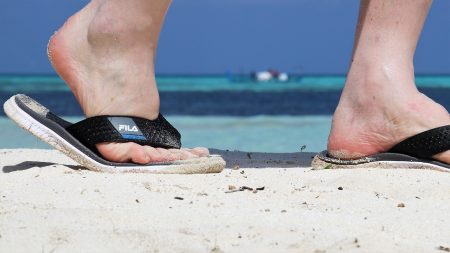- If it exists, someone somewhere has probably banned it at some point.
What is a government to do if an object, trend, or phenomenon becomes too dangerous to have around? It’s simple — just ban it.
But the thing is, what’s considered “too dangerous” doesn’t always make a whole lot of sense. As you’re surely aware, governments around the world sometimes ban utterly bizarre things based on ridiculous justifications.
There are so many examples that we could easily fill a book with this stuff. Here are just nine of the most baffling bans.
Flip-Flops — Capri, Italy
The island of Capri, off the west coast of Italy, is a popular vacation destination. But if you decide to go soak up some Mediterranean sun, you’d better pay attention to your footwear.
Flip-flops have been banned on Capri, along with other “excessively noisy” footwear. According to local authorities, Capri residents enjoy their peace and quiet, and tourists with flapping or clicking shoes simply don’t belong on the island.
Anyone caught wearing offending footwear faces “hefty” fines. So, if you’re traveling to Capri, wear proper sandals as the Caprians do.
Excessive Condiment Consumption — France
In 2011, news broke that France had banned ketchup to protect French cuisine. But that story is not true.
Instead, France has banned all condiments — in schools.
French students aren’t free to put as much ketchup, mayo, or vinaigrette on their food as they want. Instead, all condiments are distributed by canteen staff in predetermined doses as part of the country’s effort to reduce childhood obesity.
High-heeled Shoes — Greece
Capri isn’t the only Mediterranean vacation destination to ban certain types of footwear. In Greece, you might want to watch where you walk in case you happen to wear high heels.
The country has banned high heels from any and all historically significant locations. Believe it or not, though, their reasoning makes kind of sense.
High heels put more pressure on a single spot on the ground than regular shoes. The ancient paving of Greek ruins, such as the Athenian Acropolis, is so brittle that hordes of tourists in high heels could significantly damage it.
Being Overweight — Japan
The Japanese government is concerned for the health of its citizens. So concerned, in fact, that people can face repercussions for being overweight.
Companies employing Japanese people aged 40-74 are required to carry out annual waistline measurements. If an employee is too fat, the company is required to provide them with “dietary guidance.”
Any company not carrying out its proper duties can be fined. So, bosses have an incentive to encourage their employees to lose weight.
Reincarnation — China
Are you a Tibetan Buddhist monk who happened to die? If yes and you’re reading this, we assume you’ve successfully reincarnated.
But did you have a permit for that?
In Tibet, monks aren’t allowed to reincarnate without a license from the Chinese government. We have no idea how this law is enforced, but it’s an actual thing.
Foreign Wheelbarrows — Nigeria
If you’re traveling to Nigeria, make sure you haven’t packed any wheelbarrows with you. They will be confiscated on the border.
Now, Nigeria hasn’t banned all wheelbarrows — just foreign-made ones. The ban is supposedly there to protect Nigeria’s domestic wheelbarrow industry.
Furbies — United States
Remember Furbies, those soulless, weirdly threatening furballs from the ‘90s that supposedly imitated human speech? Well, they were once banned from facilities operated by the National Security Agency (NSA).
The ban was due to Furbies’ marketing. Tiger Electronics, their manufacturer, claimed that as a child played with a Furby, the thing slowly learned to speak English.
The NSA was concerned that a foreign agent could plant a hidden Furby as an NSA facility. Over time, it would begin repeating what it heard and could disclose national secrets.
In reality, Furbies don’t have any kind of artificial intelligence. Instead, their speech system works on a timer to gradually evolve from goo-goo-ga-ga to a few cohesive words.
The NSA just never bothered to actually check how Furbies function.
Running Out of Gas — Germany
You’d better check that you have a full tank of gas before you get on one of German’s famous autobahns. Running out of gas on one of these highways is strictly verboten.
There’s a good reason for that, though. Autobahns have no legally enforced speed limits so people drive at absolutely ridiculous speeds on them.
As a result, any car stopped on the road puts everybody in great danger. Stopping for any reason — whether due to running out of gas or experiencing a breakdown — will get you fined.
Time Travel — China
China doesn’t just ban reincarnation. Time travel is also a big no-no in the country.
Granted, this ban concerns only movies. Films featuring time travel are banned in China as the government is concerned they could lead to a “distorted perception of history.”
Then again, if time travel is banned in movies, you can bet that it’ll be banned in real life as well. So, if you invent a time machine, don’t take it to China.
Memes — Australia
Memes are everywhere on the internet. But in Australia, they’re technically illegal.
Australia has incredibly strict copyright laws that prohibit “distributing an infringing article that prejudicially affects the copyright owner.” Since memes are usually pretty irreverent and the people making them sure don’t pay for the pictures they use, they are illegal.
Of course, the law is pretty impossible to enforce to its full extent and it’s unlikely you’d get in trouble for slapping some text on an image. Nonetheless, memes are on the Australian government’s ban list, no matter how dank they are.
Hits: 0























